

Rabindranath Tagore - Biography. Rabindranath Tagore (1861-1941) was the youngest son of Debendranath Tagore, a leader of the Brahmo Samaj, which was a new religious sect in nineteenth-century Bengal and which attempted a revival of the ultimate monistic basis of Hinduism as laid down in the Upanishads.
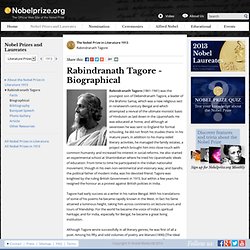
He was educated at home; and although at seventeen he was sent to England for formal schooling, he did not finish his studies there. In his mature years, in addition to his many-sided literary activities, he managed the family estates, a project which brought him into close touch with common humanity and increased his interest in social reforms. He also started an experimental school at Shantiniketan where he tried his Upanishadic ideals of education.
Abraham Lincoln. Lincoln warned the South in his Inaugural Address: "In your hands, my dissatisfied fellow countrymen, and not in mine, is the momentous issue of civil war.
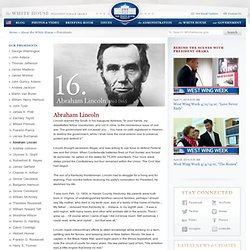
The government will not assail you.... You have no oath registered in Heaven to destroy the government, while I shall have the most solemn one to preserve, protect and defend it. " Lincoln thought secession illegal, and was willing to use force to defend Federal law and the Union. When Confederate batteries fired on Fort Sumter and forced its surrender, he called on the states for 75,000 volunteers. Four more slave states joined the Confederacy but four remained within the Union. The son of a Kentucky frontiersman, Lincoln had to struggle for a living and for learning. "I was born Feb. 12, 1809, in Hardin County, Kentucky. Mère Teresa de Calcutta (1910-1997), biographie. Mère Teresa de Calcutta (1910-1997) “ Par mon sang, je suis albanaise.
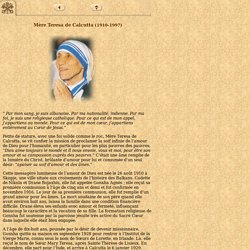
Par ma nationalité, indienne. Par ma foi, je suis une religieuse catholique. Pour ce qui est de mon appel, j’appartiens au monde. F.W. de Klerk - Biography. Frederik Willem de Klerk was born in Johannesburg on March 18, 1936.
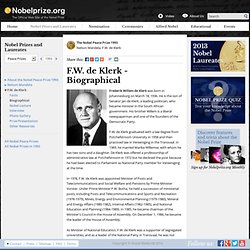
He is the son of Senator Jan de Klerk, a leading politician, who became minister in the South African government. His brother Willem is a liberal newspaperman and one of the founders of the Democratic Party. F.W. de Klerk graduated with a law degree from Potchefstroom University in 1958 and then practiced law in Vereeniging in the Transvaal. In 1969, he married Marike Willemse, with whom he has two sons and a daughter. De Klerk was offered a professorship of administrative law at Potchefstroom in 1972 but he declined the post because he had been elected to Parliament as National Party member for Vereeniging at the time.
In 1978, F.W. de Klerk was appointed Minister of Posts and Telecommunications and Social Welfare and Pensions by Prime Minister Vorster. In his first speech after assuming the party leadership he called for a nonracist South Africa and for negotiations about the country's future. From Les Prix Nobel. Desmond Tutu Peace Centre. Biographie de Martin Luther King. Martin Luther King (1929 - 1968) biographie par Christian Delorme, Directeur de Publication d'Alternatives Non Violentes Martin Luther King est né à Atlanta, en Géorgie, le 15 janvier 1929.
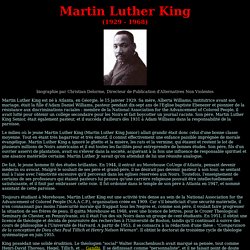
Nelson Mandela Centre of Memory. Former President Mandela’s condition remains unchanged: issued by the Presidency. Former President Nelson Mandela's condition remains unchanged in hospital and doctors continue to do their best to ensure his recovery, well-being and comfort.

President Zuma thanks the South African public for ongoing support and understanding. "We must support him and support his family. We must demonstrate our love and appreciation for his leadership during the struggle for liberation and in our first few years of freedom and democracy by living out his legacy and promoting unity, non-racialism, non-sexism and prosperity in our country," said President Zuma.
Former President Mandela will turn 95 on the 18th of July. "We must all be planning what to do next month in marking our 67 minutes of doing good for humanity as called upon by Madiba to do so, when he launched the International Mandela Day campaign. Nelson Mandela : au nom de la liberté. Abbé Raynal. Albert Schweitzer. Gandhi (1869 - 1948) - Une vie au service de la non-violence. Après toute une vie consacrée à l'émancipation de l'Inde, Gandhi a eu la douleur de voir son pays se déchirer dans des guerres religieuses sanglantes entre hindous et musulmans.

Lui-même hindou, il n'a cessé de plaider pour la réconciliation des deux communautés, ce qui lui a valu d'être accusé de trahison par les fanatiques de sa communauté. Gandhi n'en figure pas moins au panthéon des plus grandes personnalités du XXe siècle. Gandhi démontre l'efficacité de la non-violence Mohandas Karamchand Gandhi naît le 2 octobre 1869 à Porbandar, dans une famille de riches commerçants du Gudjerat, au nord-ouest de l'Empire britannique des Indes. Il fait des études d'avocat à Londres puis, trop timide pour plaider en Inde, part en mai 1893 en Afrique du Sud où s'est établie une nombreuse communauté originaire des Indes. Néanmoins, ill se comporte loyalement à l'égard des Britanniques pendant leur guerre contre les Boers, en 1899-1901, et organise un service d'ambulances avec un personnel indien.
Le mythe de Gandhi est l'une des plus grandes supercheries de l'histoire. Le mahatma était un vilain petit vicelard mais le plus important c'est que sans sa doctrine absurde de la non-violence, l'Inde aurait pu se libérer sur le champ de la tutelle anglaise.

Le mode de vie austère du Mahatma est aujourd’hui bien ancré dans l’imaginaire collectif de l’Inde comme du reste du monde. Il s’agissait pourtant d’une suprême supercherie politique. Son prétendu dénuement n’était qu’un mythe, fruit d’une grande opération de communication.